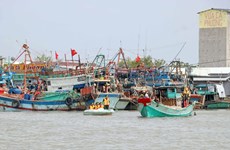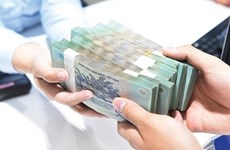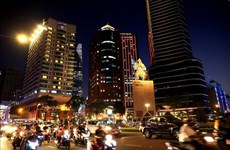Get tough on economy: experts
A Vietnamese financial expert has predicted an economically gloomier year for 2012 as the recession bottomed out.
"Stronger measures must be taken to restructure the economy," director of the Vietnam Institute of Economics, Tran Dinh Thien, told a conference held by the National Financial Supervisory Committee on Jan 9.
"The world is on eve of a financial crisis and this has revealed the instabilities of Vietnam in the global economy. It will be a very hard year for Vietnam and the recession will reach its bottom."
"Stronger measures must be taken to restructure the economy," director of the Vietnam Institute of Economics, Tran Dinh Thien, told a conference held by the National Financial Supervisory Committee on Jan 9.
"The world is on eve of a financial crisis and this has revealed the instabilities of Vietnam in the global economy. It will be a very hard year for Vietnam and the recession will reach its bottom."
A Vietnamese financial expert has predicted an economically gloomier year for 2012 as the recession bottomed out.
"Stronger measures must be taken to restructure the economy," director of the Vietnam Institute of Economics, Tran Dinh Thien, told a conference held by the National Financial Supervisory Committee on Jan 9.
"The world is on eve of a financial crisis and this has revealed the instabilities of Vietnam in the global economy. It will be a very hard year for Vietnam and the recession will reach its bottom."
Thien said the nation entered the year with a more fragile economic base following the economic downtrend, high inflation and the trade and State budget deficits that took root many years ago.
He added that stagnation combined with high inflation poses a great danger to the economy that worries economists about a trade-off between growth and stability.
If the Government prioritises curbing inflation, economic stagnation will grow worse, and if focus is put on curing economic stagnation, inflation will continue climbing up and be out of control.
Thien said the best scenario for this year's economic development, in which it is hoped GDP growth will reach 6 percent, will be if the world economy grows by about 4 percent and there is an increase of about 8 percent in private investment.
But the 6 percent GDP growth, the goal set by the National Assembly, will be far from reach, said the director of the Vietnam Centre for Economic and Policy, Nguyen Duc Thanh.
Thanh said that he does not expect any economic recovery this year.
Although the goal of curbing inflation from more than 22 percent to below 10 percent can be achieved, the interest rate will remain high and enterprises will continue undergoing a stormy time for, at least, the first six months of the year, he added.
According to deputy director of the National Financial Supervisory Commission, Le Xuan Nghia, bank liquidity is the biggest headache that has to be solved this year for the survival of the economy.
He said the banking system has been weakened by rising bad debts, overdue debts and soaring potential risks in liquidity after several years of rapid growth.
If bank liquidity is not improved, the interest rate will not be lowered, the real estate and stock market will stay frozen and bad debts unresolved. This will mean the restructuring of the economy has failed.
"It is time to take strong measures to raise bank liquidity before things get out of control," Nghia said.
However, he added that it is questionable if 12 months are long enough to lower loan interest rates or to remove the ceiling interest rate - or to stabilise the gold price.
Meanwhile director of the Vietnam Institute of Economics Vu Viet Ngoan said that the ceiling loan interest rate must be reduced by 4-5 percent this year to help the nation overcome its difficulties.
Other financial commentators said that to improve the situation, the Government should continue to tighten fiscal and financial policies while enhancing the restructuring of public investment, the banking system and the State-owned enterprise sector.
Meanwhile, Thanh said the restructuring of the economy will take a long time and be costly, and requires strong steps to "purify" the system of State-owned enterprises. A representative from Lien Viet Bank said even bankruptcy must be accepted for long-term development.
During the past four year, the economy of Vietnam has been on a downtrend as macro-economic instabilities increased.
Average inflation in the period was 14.4 percent, fluctuating from 6.9 percent to 23 percent.
The average GDP growth rate also witnessed a decrease from 8 percent in 2002-07 to 6 percent./.
"Stronger measures must be taken to restructure the economy," director of the Vietnam Institute of Economics, Tran Dinh Thien, told a conference held by the National Financial Supervisory Committee on Jan 9.
"The world is on eve of a financial crisis and this has revealed the instabilities of Vietnam in the global economy. It will be a very hard year for Vietnam and the recession will reach its bottom."
Thien said the nation entered the year with a more fragile economic base following the economic downtrend, high inflation and the trade and State budget deficits that took root many years ago.
He added that stagnation combined with high inflation poses a great danger to the economy that worries economists about a trade-off between growth and stability.
If the Government prioritises curbing inflation, economic stagnation will grow worse, and if focus is put on curing economic stagnation, inflation will continue climbing up and be out of control.
Thien said the best scenario for this year's economic development, in which it is hoped GDP growth will reach 6 percent, will be if the world economy grows by about 4 percent and there is an increase of about 8 percent in private investment.
But the 6 percent GDP growth, the goal set by the National Assembly, will be far from reach, said the director of the Vietnam Centre for Economic and Policy, Nguyen Duc Thanh.
Thanh said that he does not expect any economic recovery this year.
Although the goal of curbing inflation from more than 22 percent to below 10 percent can be achieved, the interest rate will remain high and enterprises will continue undergoing a stormy time for, at least, the first six months of the year, he added.
According to deputy director of the National Financial Supervisory Commission, Le Xuan Nghia, bank liquidity is the biggest headache that has to be solved this year for the survival of the economy.
He said the banking system has been weakened by rising bad debts, overdue debts and soaring potential risks in liquidity after several years of rapid growth.
If bank liquidity is not improved, the interest rate will not be lowered, the real estate and stock market will stay frozen and bad debts unresolved. This will mean the restructuring of the economy has failed.
"It is time to take strong measures to raise bank liquidity before things get out of control," Nghia said.
However, he added that it is questionable if 12 months are long enough to lower loan interest rates or to remove the ceiling interest rate - or to stabilise the gold price.
Meanwhile director of the Vietnam Institute of Economics Vu Viet Ngoan said that the ceiling loan interest rate must be reduced by 4-5 percent this year to help the nation overcome its difficulties.
Other financial commentators said that to improve the situation, the Government should continue to tighten fiscal and financial policies while enhancing the restructuring of public investment, the banking system and the State-owned enterprise sector.
Meanwhile, Thanh said the restructuring of the economy will take a long time and be costly, and requires strong steps to "purify" the system of State-owned enterprises. A representative from Lien Viet Bank said even bankruptcy must be accepted for long-term development.
During the past four year, the economy of Vietnam has been on a downtrend as macro-economic instabilities increased.
Average inflation in the period was 14.4 percent, fluctuating from 6.9 percent to 23 percent.
The average GDP growth rate also witnessed a decrease from 8 percent in 2002-07 to 6 percent./.













